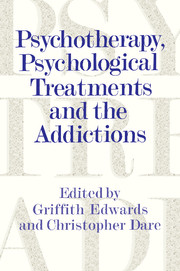Book contents
- Frontmatter
- Contents
- List of contributors
- Psychotherapy and psychological treatments of substance problems: generalism, specialism and the building of bridges
- Acknowledgements
- Part one Backgrounds to therapeutic understanding
- Part two Treatments
- 5 Psychotherapy: why do some need more and some need less?
- 6 Addictive behaviour: the next clinic appointment
- 7 Advances in families and couples therapy
- 8 Solution focused brief therapy: a co-operative approach to work with clients
- 9 Recent developments in cognitive and behavioural therapies
- 10 Cognitive and behavioural treatments for substance misuse
- 11 Motivational issues in the treatment of addictive behaviour
- 12 Can ‘stages of change’ provide guidance in the treatment of addictions? A critical examination of Prochaska and DiClemente's model
- 13 Group therapy and the addictions
- 14 Alcoholics Anonymous as mirror held up to nature
- 15 How therapeutic communities work
- Part three Postscript
- Index
10 - Cognitive and behavioural treatments for substance misuse
from Part two - Treatments
Published online by Cambridge University Press: 05 August 2016
- Frontmatter
- Contents
- List of contributors
- Psychotherapy and psychological treatments of substance problems: generalism, specialism and the building of bridges
- Acknowledgements
- Part one Backgrounds to therapeutic understanding
- Part two Treatments
- 5 Psychotherapy: why do some need more and some need less?
- 6 Addictive behaviour: the next clinic appointment
- 7 Advances in families and couples therapy
- 8 Solution focused brief therapy: a co-operative approach to work with clients
- 9 Recent developments in cognitive and behavioural therapies
- 10 Cognitive and behavioural treatments for substance misuse
- 11 Motivational issues in the treatment of addictive behaviour
- 12 Can ‘stages of change’ provide guidance in the treatment of addictions? A critical examination of Prochaska and DiClemente's model
- 13 Group therapy and the addictions
- 14 Alcoholics Anonymous as mirror held up to nature
- 15 How therapeutic communities work
- Part three Postscript
- Index
Summary
Assessment and goal setting
Assessment is an important first stage of treatment. It should not be relegated merely to the role of an impersonal procedure to be completed prior to treatment. Just as the drinker or drug-taker is actively involved in his or her own addictive behaviour, so they must be actively involved in their own recovery. It is the responsibility of the therapist to use assessment as an important opportunity to encourage that involvement. Indeed, it may be more appropriate to regard this first stage of treatment as reaching a mutual agreement about goals rather than simply setting goals.
Psychology has always had a primary interest in behaviour, and among the general themes of psychological treatments for addiction problems two prominent issues have been the focus upon the psychosocial context in which drug-taking occurs, and the targeting of interventions at addictive behaviour. Psychology has also shown a particular interest in the antecedents of the overlearned habits that are the addictions, including the situational and environmental circumstances in which the behaviour occurs, the beliefs and expectations of the user, and his or her prior learning experiences with the drug itself. In addition, psychology has an equal interest in the consequences of these behaviours, and specifically in the reinforcing effects that may lead to increased use and the negative consequences that may serve to inhibit the behaviour.
Traditional types of assessment procedures for behaviour modification programmes as described by Kanfer and Phillips (1970) have been found to be directly applicable to the treatment of addictive behaviour. Information is needed about target behaviours, the reinforcement parameters maintaining them, opportunities in the environment for maintaining other more desirable responses, and the individuals’ ability to observe and reinforce themselves.
For all types of drug problems that require treatment, the intervention offered should be tailored to the needs and circumstances of the individual. This apparently simply and uncontentious statement turns out to have complex and far-reaching implications for policy and services if it is seriously applied in clinical practice (Gossop, 1987). There is not, nor can there be expected to be, any single best treatment for these problems. Both aetiology and outcome are influenced by a broad range of different factors that will differ in important respects from person to person.
- Type
- Chapter
- Information
- Psychotherapy, Psychological Treatments and the Addictions , pp. 158 - 172Publisher: Cambridge University PressPrint publication year: 1996
- 2
- Cited by



